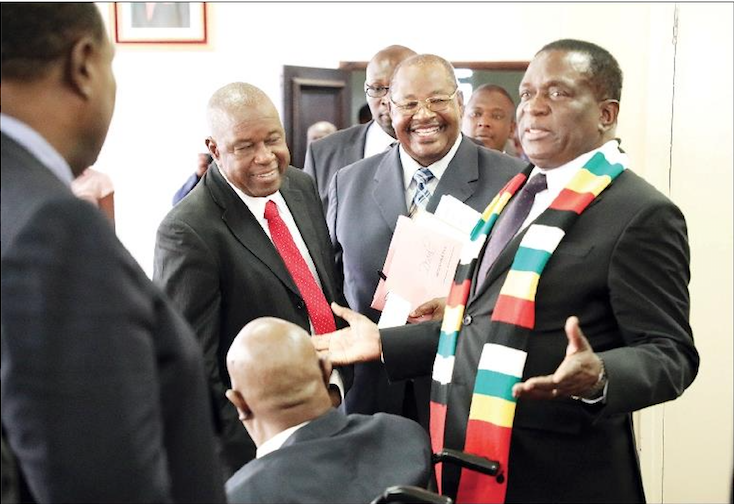GOVERNMENT has started the process of reforming the public service with a view to streamlining it in line with the Second Republic transformation agenda.
This was said by the Chief Secretary to the President and Cabinet, Dr Misheck Sibanda, when he officiated at a Public Service Commission (PSC) Strategic Planning Workshop in Victoria Falls on Wednesday.
Dr Sibanda said under the new dispensation, those in public posts have to prove their worth through effective discharge of duty. The reform process will result in some civil service workers being retired, transferred, merged or dismissed from work-based on performance with the aim of reorienting the civil service in line with the dictates of the new dispensation.
Dr Sibanda called for a mindset change saying the civil service should be guided by values of responsiveness, accountability, high performance, culture and diversity.
"President Mnangagwa has made the rapid transformation of the country's economy a major priority for his government and as such government has put in place the Transitional Stabilisation Programme (TSP) as the first step.
"This emerging reality requires that we develop a new civil service cadreship with an embodiment of the high performance culture, servant leadership, professional probity and sublime patriotism," he said. Dr Sibanda said the attainment of an upper middle class economy by 2030 hinges on the existence of a versatile, highly motivated and responsive civil service.
"This workshop should lay a foundation for the creation of a competitive civil service system capable of attracting and deploying the best talent and skills reposing in our diverse socio-cultural groupings and across the gender divide.
"There will be decentralisation of civil service operations in line with the devolution policy approved by Cabinet and I'm happy that the PSC realises that its first step is to review itself. We promise we will work together as we move forward hence there is a need for a paradigm shift and adoption of servant leadership to promote citizens' interests," he said.
Dr Sibanda said in the Second Republic, the civil service will be subject to public scrutiny as opposed to the old public service which was known to embrace lethargy and denying citizens the right to services. He said such a retrogressive culture has no place in the New Republic where President Mnangagwa has called for a responsive civil service which exhibits servant leadership.
This underscores the need for quality service delivery through adoption of a customer centric and resultsoriented approach guided by the Integrated Results Based Management system.
Dr Sibanda said the thrust of the new dispensation is to right size public service employment and strengthen wage bill management, rapid implementation of parastatals and state enterprises reforms as well as fight corruption through strict observation of code of ethics.
He called for constant training programmes to re-skill the workforce in line with changing global trends.
Dr Sibanda said government is already seized with specific measures aimed at achieving the transformation goal as he also challenged civil servants to be transparent in the way they use public resources in light of constraints obtaining.
PSC chairperson Dr Vincent Hungwe said the commission will present its roadmap to the OPC before year end. He said the aim was to ensure that all line ministries reconstitute in line with the changing environment and contribute to national fiscal consolidation.
"President Mnangagwa has already walked the talk by appointing a leaner Cabinet of 20 Ministers. Back then the situation allowed a big PSC secretariat but now the situation requires us to rethink our structures to be leaner and constitute a better fit for the Second Republic.
"Because of resource constraints, we need a leaner, agile and flexible mechanism because the worker of the future must not be the same as that of the past. We'll be re-skilling people and merging responsibilities or transferring individuals. If we bring in the private sector then we need a new set of skills and yes, some individuals will be retired because that's legal and some will be dropped," Dr Hungwe said.
The week-long workshops ends today.
- chronicle
 Concern over Masvingo black market
Concern over Masvingo black market  Kenya declares three days of mourning for Mugabe
Kenya declares three days of mourning for Mugabe  UK's Boris Johnson quits over Brexit stretegy
UK's Boris Johnson quits over Brexit stretegy  SecZim licences VFEX
SecZim licences VFEX  Zimbabwe abandons debt relief initiative
Zimbabwe abandons debt relief initiative  European Investment Bank warms up to Zimbabwe
European Investment Bank warms up to Zimbabwe  Young Investment Professional (YIP) Graduate Programme 2019
Young Investment Professional (YIP) Graduate Programme 2019 











 Young Investment Professional (YIP) Graduate Programme 2019
Young Investment Professional (YIP) Graduate Programme 2019
Editor's Pick